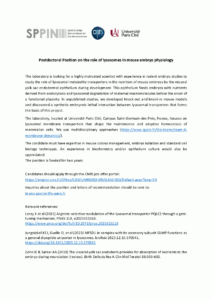News, Opportunities, Pending opportunities
Open postdoctoral Position on the role of lysosomes in mouse embryo physiology
The laboratory is looking for a highly motivated scientist with experience in rodent embryo studies to study the role of lysosomal metabolite transporters in the nutrition of mouse embryos by the visceral yolk sac endodermal epithelium during development. This epithelium feeds embryos with nutrients derived from endocytosis and lysosomal degradation of maternal macromolecules before the onset of a functional placenta. In unpublished studies, we developed knock-out and knock-in mouse models and discovered a synthetic embryonic lethal interaction between lysosomal transporters that forms the basis of this project.
The laboratory, located at Université Paris Cité, Campus Saint-Germain-des-Prés, France, focuses on lysosomal membrane transporters that shape the maintenance and adaptive homeostasis of mammalian cells. We use multidisciplinary approaches.
The candidate must have expertise in mouse colony management, embryo isolation and standard cell biology techniques. An experience in biochemistry and/or epithelium culture would also be appreciated.
The position is funded for two years.
Candidates should apply through the CNRS job offer portal.
Inquiries about the position and letters of recommendation should be sent to:
- Bruno Gasnier, Senior Research Scientist, PI, CNRS, Team 4 - Membrane dynamics, +33 1 70 64 99 15, room 626
Relevant references:
- Leray X et al (2021) Arginine-selective modulation of the lysosomal transporter PQLC2 through a gate-tuning mechanism, PNAS 118, e2025315118.
- Jungnickel KEJ, Guelle O, et al (2023) MFSD1 in complex with its accessory subunit GLMP functions as a general dipeptide uniporter in lysosomes. bioRxiv 2023.12.15.570541.
- Zohn IE & Sarkar AA (2010) The visceral yolk sac endoderm provides for absorption of nutrients to the embryo during neurulation (review). Birth Defects Res A Clin Mol Teratol 88:593-600.


